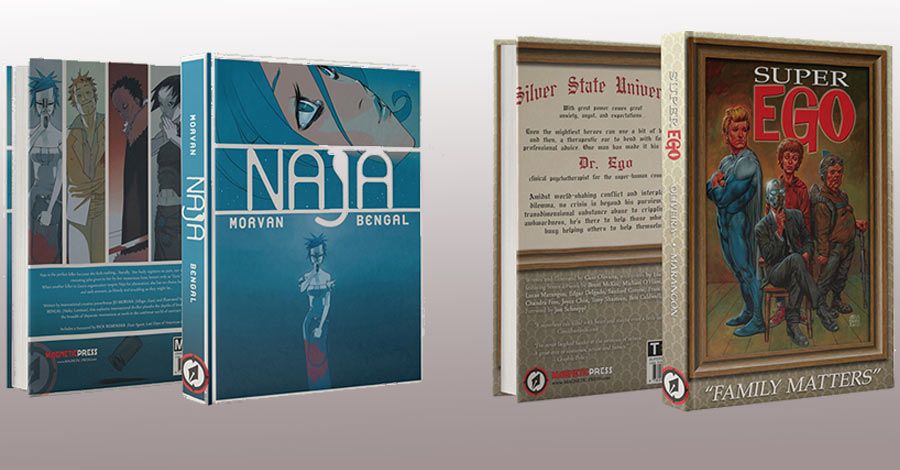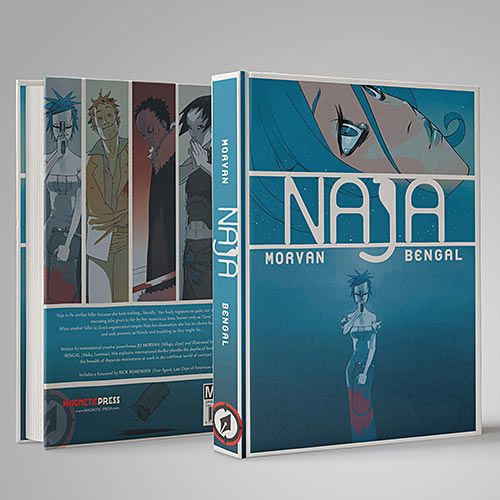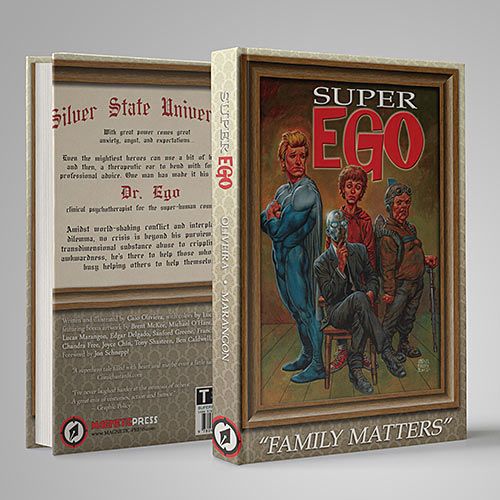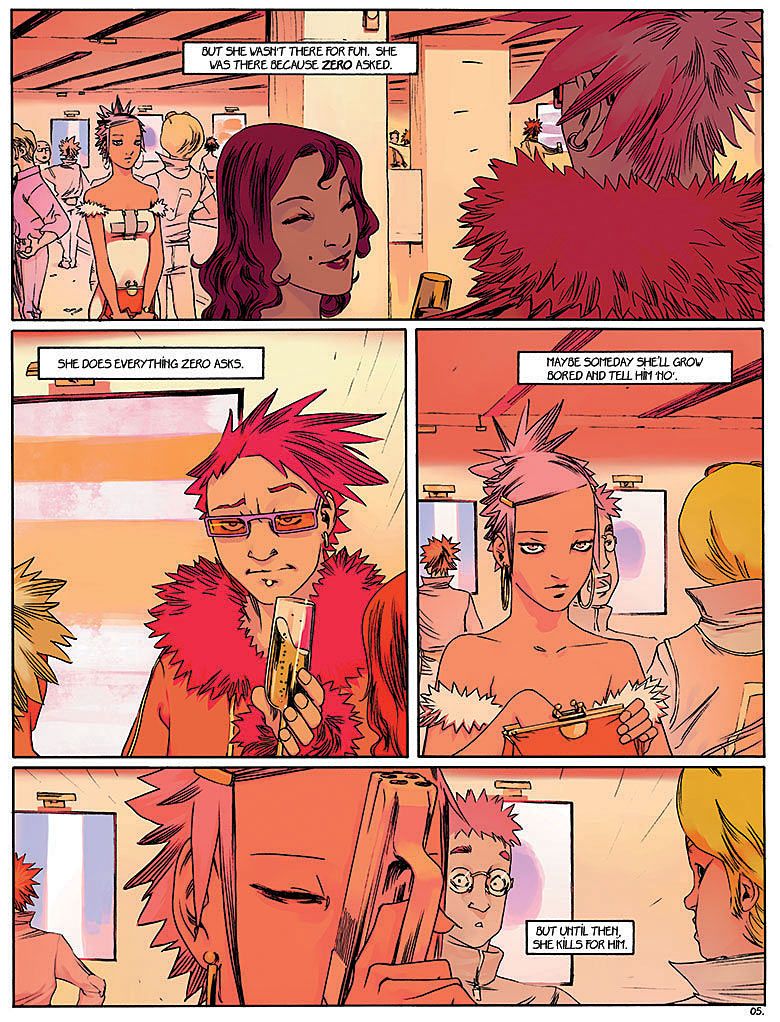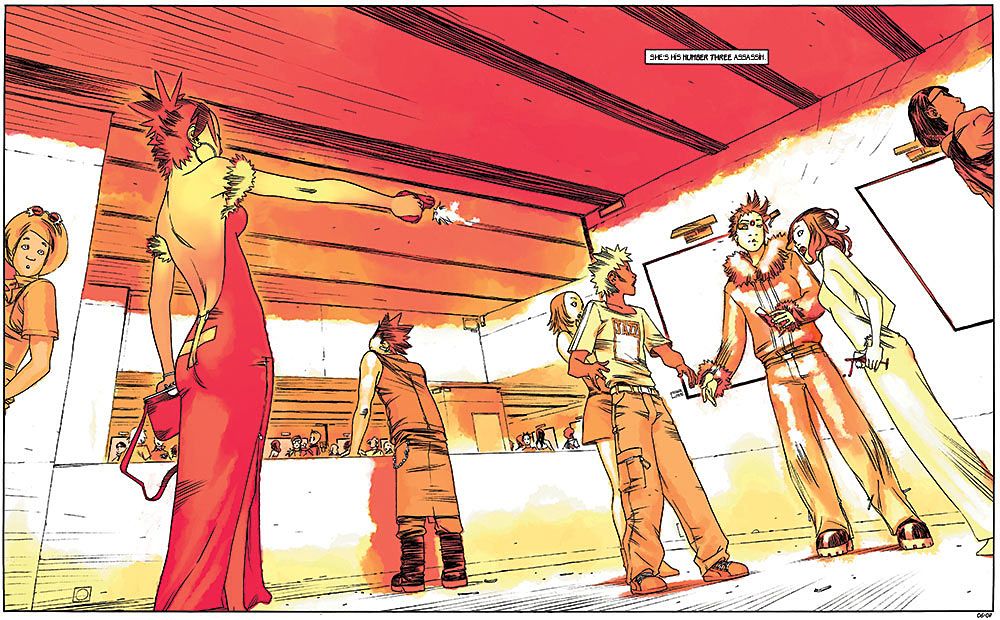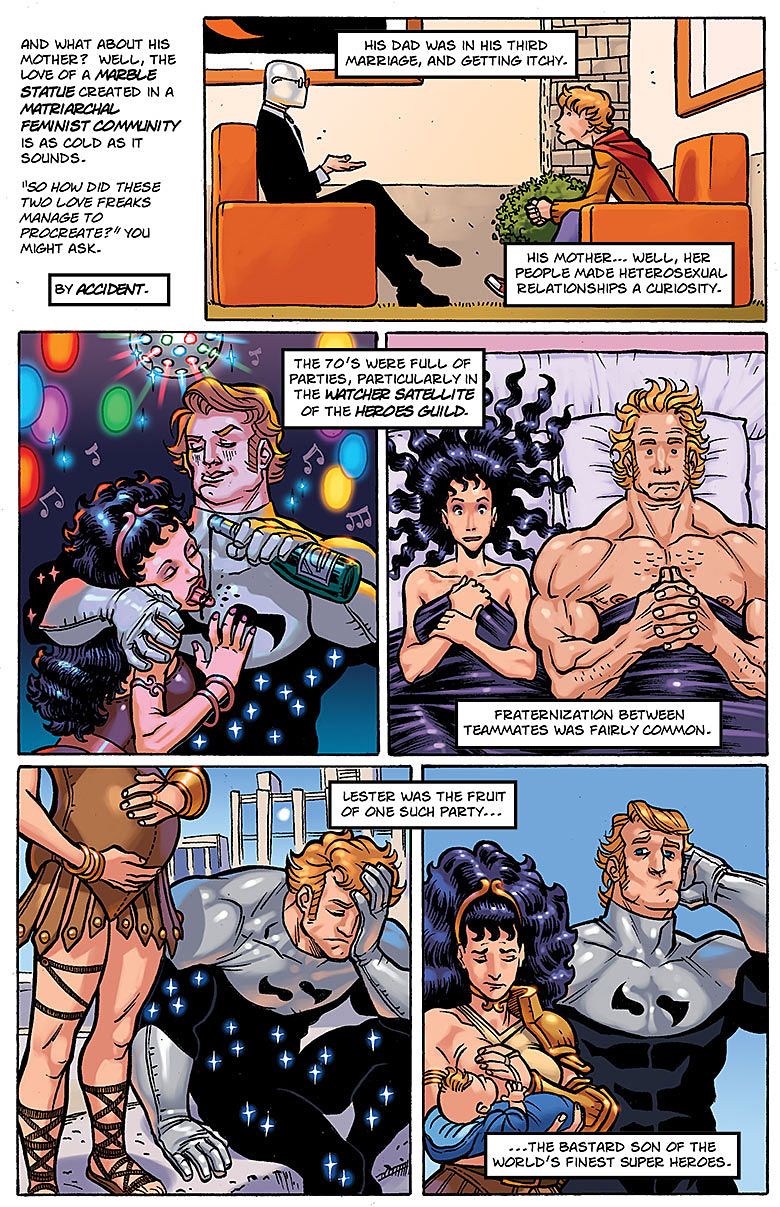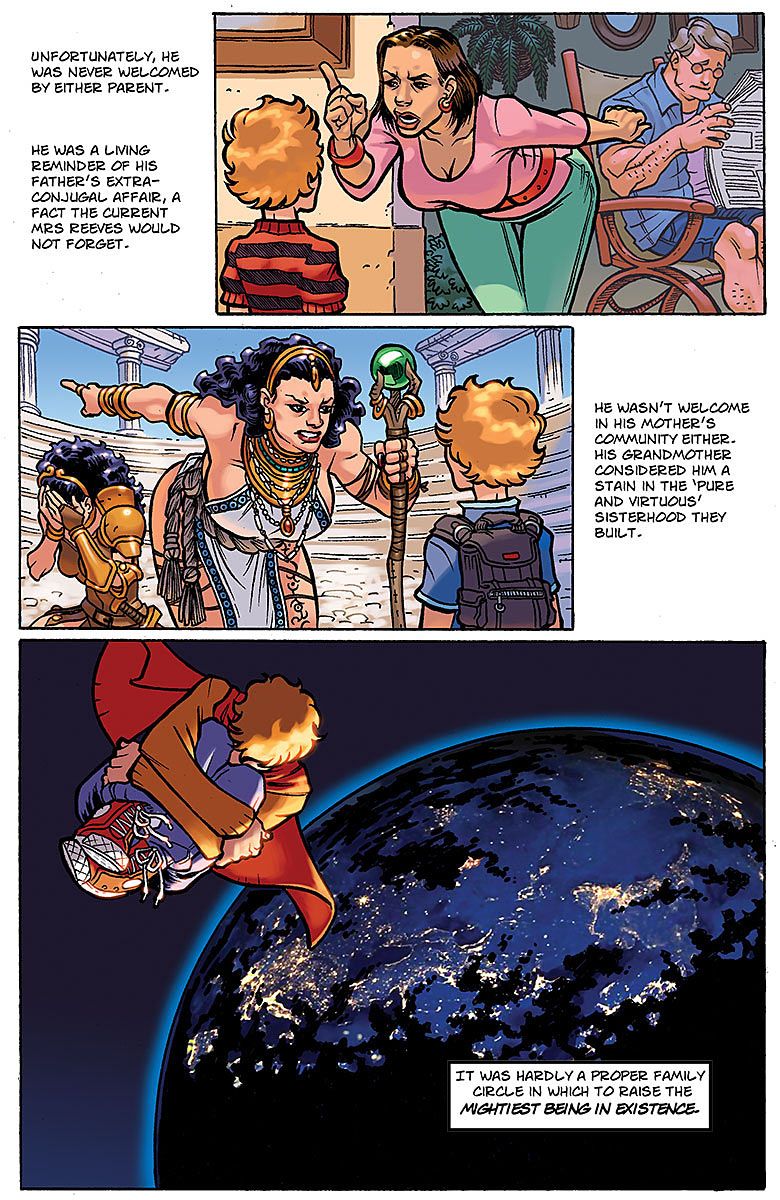In a market seething with new, inventive ways to distribute work, it seems slightly problematic to jump into the frying pan and announce that, hey, you've got a brand new bag, too. So how do you stand apart from the crowd -- what's an intuitive way that you qualify your recently-established comic book publishing house? How do you take a slice of the savory market pie? If one were to take a page out of former Arcahia publisher Mike Kennedy and former VP of Publishing at BOOM! Studios Wes Harris' respective books, it's all about delivering quality product. Essentially, cut down on the superfluous outflow, hike up the production quality, and fully nurture each individual title.
So it is written, so it is done. Thus, Kennedy and Harris' new publishing house, Magnetic Press, is born. They'll kick off their line of books with "Super-Ego" and "Naja" -- and it's clear from speaking to them that both publisher veterans know the score, they know their audience, and that their business plan is sound. Kennedy and Harris sat down with CBR News to speak spoke about their respective involvement in and out of the industry, their international talent pool (and property development), as well as what drove them to create a new publishing house in an already crowded and volatile market.
CBR News: Guys, tell me about Magnetic Press. Where did the idea come from? And why start a publishing company now, in this particular market?
Mike Kennedy: Wes and I both had similar but separate aspirations of starting up a new label where we could help foster projects we had personal interest in, and assist creators we believed in to either make their first big splash in the market or build on existing professional momentum that could use some TLC. We're huge proponents of creator equity, having been creators ourselves, and we both felt like we could build a comfortable, transparent, and successful publishing sanctuary for creators both new and established. With the industry model shifting so dramatically over the past few years, it seemed like the time was right for a Jerry Maguire moment -- to step out small yet dedicated to redefining the personal relationship between creator and publisher.
Wes Harris: Not just in publishing and comics, but all entertainment is in transition right now. You've got Netflix backing multiple seasons without testing a pilot. Multi-million dollar video games are being crowdsource financed without publishers. And, of course, comics creators are finding that what they want and need from a publisher has changed. I don't think of what we're doing with Magnetic as disruptive. It's more of a response to the real current landscape where the relationship between creators and publishers has to become more of a partnership.
Mike, Wes, for the uninitiated, do you mind giving a bit of background on yourselves and what brought you to this point?
Kennedy: My career was spent primarily in the video game industry, developing and producing story designs and cinematic material for publishers such as Namco, Activision, Electronic Arts, Microsoft, etc. At the same time, I also wrote a bunch of comics for Dark Horse and DC, including several "Star Wars" and "AvP" arcs, a "Superman" graphic novel, "Ghost," "Lone Wolf 2100," "Aeon Flux," and a bunch of others. The two activities frequently crossed over each other, with some comic connections pulled into the gaming side, and some game connections carried into the comic side. After 20 years straddling both fields, I joined Archaia Entertainment as Publisher, where we earned back-to-back Best Original Graphic Album Eisners, on top of numerous other awards. It was a crash course in the publishing business, but a valuable one that led directly to the streamlined approach of Magnetic.
Harris: I had the best initiation into being a professional nerd when I started at White Wolf to help with the launch of the first "World of Darkness" books. The culture there was a collaborative sandbox for a group of amazingly creative people. I tried to take that same philosophy into video game development when I left White Wolf and started an animation and art development studio, called Secret Weapon, working on game art for Electronic Arts, Sony, Microsoft and others. If you're a gamer over 20, you've undoubtedly played some of the levels we helped create! I also spent some time at Viz Media before joining up with the incredibly talented team at BOOM! Studios. Most recently I was running the transmedia program for the "Hawken" PC game at Meteor Entertainment.
What roles do you both play at Magnetic Press? Does one handle the talent, while the other the business & logistics?
Kennedy: Yeah, that's pretty accurate -- I handle most of the editorial and production coordination between content creators, licensors and printers, managing the completion of the material and design process from talent to final product. We split the management of distribution and fulfillment, depending on what stage of the process a conversation is at. We both watch for exciting projects and pursue titles we think fit the brand. We have pretty similar tastes, so that helps in a lot of cases.
When can we start seeing some of the books and products your publishing house will be producing? What titles do you have lined up?
Kennedy: We just sent our first two titles to the printers last week! "Naja" and "Super-Ego" both turned out really, really nice, and we're extremely excited to get both on the shelves in May. We already have several more lined up to follow in the months past that, including "Meka" and "Zaya", which we've already announced, and Dave Dorman's "Wasted Lands" Omnibus, which we're just now announcing to the world. It will be a collection of new, re-mastered, and out-of-print material based in his creator-owned "Wasted Lands" universe, which together will form a prestigious artbook and sourcebook for many other related "Wasted Lands" materials in the works, including a board game and new, continuing stories.
Harris: We'll have at least four or five books available by San Diego Comic-Con, and will publish one-to-two new books coming out each month after that. There are a number of exciting titles for the Fall that we're excited to talk about, but we're holding those announcements until the timing is right.
Let's talk about international presence. Your line-up is pretty geographically diverse. How does this affect your market presence and readership? Or is it a simple matter of casting a wider net of awareness and readership?
Kennedy: It's true that many of our first year titles are by international talent, with creators hailing from France, China, Brazil, Argentina, and Spain, but that lineup wasn't intentionally collected by design. Wes and I have both had experience with foreign territories, in both Europe and Asia, and when the idea of starting a new label came up, the first titles that came to both of our minds just happened to be foreign titles we had become fans of. Frankly, neither of us had any interest in starting "another comic book company," and from the get-go we agreed that we wanted to stand apart in both content and format.
Harris: Format-wise, we both love the physical presence of a well-crafted hardcover, and we wanted to launch in that space, with an eye for production quality and design on the outside as well as inside. Content-wise, we've just found ourselves drawn to a diverse array of visual styles and storytelling devices.
Kennedy: JD Morvan, author of "Naja," "Meka," and "Zaya" (three totally unrelated books, despite their similar titles) is quite well-known and respected in the European and Asian creative community, and he has introduced us to all sorts of amazing books and creators, most of which are totally unknown in the US and English-language marketplace. We're more than happy to carry that forward by introducing those titles and creators to a North American audience. We believe all of the creators we help represent can and should be celebrated here as much as they are in their home country.
How do you plan on attracting new and seasoned talent? Is there a standard submission process or will you simply approach those you wish to work with?
Kennedy: Well, our first priority will be treating every book we publish with the individual TLC it deserves, with unique marketing strategies and designs created in direct cooperation with the creator themselves. Every book needs to be represented as if it is our only book -- we don't want anything to get overshadowed internally, or serviced poorly by a systematic PR formula. We hope that in a short amount of time, that TLC will shine on its own, more so than the competitive details of any publishing agreement we offer.
Harris: As mentioned, we already have a few more notable creator-owned titles just waiting to be announced, and we hope that, in time, the happy family will grow by word of mouth. That's not to say we aren't open to submissions, but until we can set-up a formal channel, we'll be reviewing opportunities privately. That's as much in the best interests of a title's caretaking as it is in protecting our workload, sanity, and cashflow.
What's the difference between Magnetic Press and your former, respective publishing houses?
Kennedy: Personally, I'm immensely proud of the work we did at Archaia, and the quality of product we brought to market during the last few years. And I'll continue to be excited for whatever they put out under the BOOM! Studios banner as well. I don't think there's any shame in saying we hope to essentially carry that torch of quality with our library as well! There is a lot to that format and model to love! The difference, however, will likely be most evident in the sort of content we release. While we will offer European and original domestic material in a similar mix, those selections will likely reflect our personal preferences in style and genre, as well as grow out of our personal interactions and discoveries within the global creative community. Since title TLC is such a priority, we're going to be sure that we personally love every book we do. We also hope to offer a related range of diverse materials over time, including art books, card and tabletop games, appropriate merch, and hopefully in time, interactive digital games as well.
Harris: Every publisher has a unique perspective on how it approaches creative. I've been under the hood on the three wildly divergent styles of creative development at BOOM!, Viz and White Wolf, and they were all successful in finding a creative style that delivered what they wanted to accomplish. Mike and I are working to craft a new form of publisher to embrace highly creative talent, domestic and international, who are underserved by the traditional models and the ideas about what comics should be. You're going to see us crossing genres and formats with quality of storytelling and production as the primary unifying element.
Stay tuned to CBR News for more on Magnetic Press and their upcoming projects.

